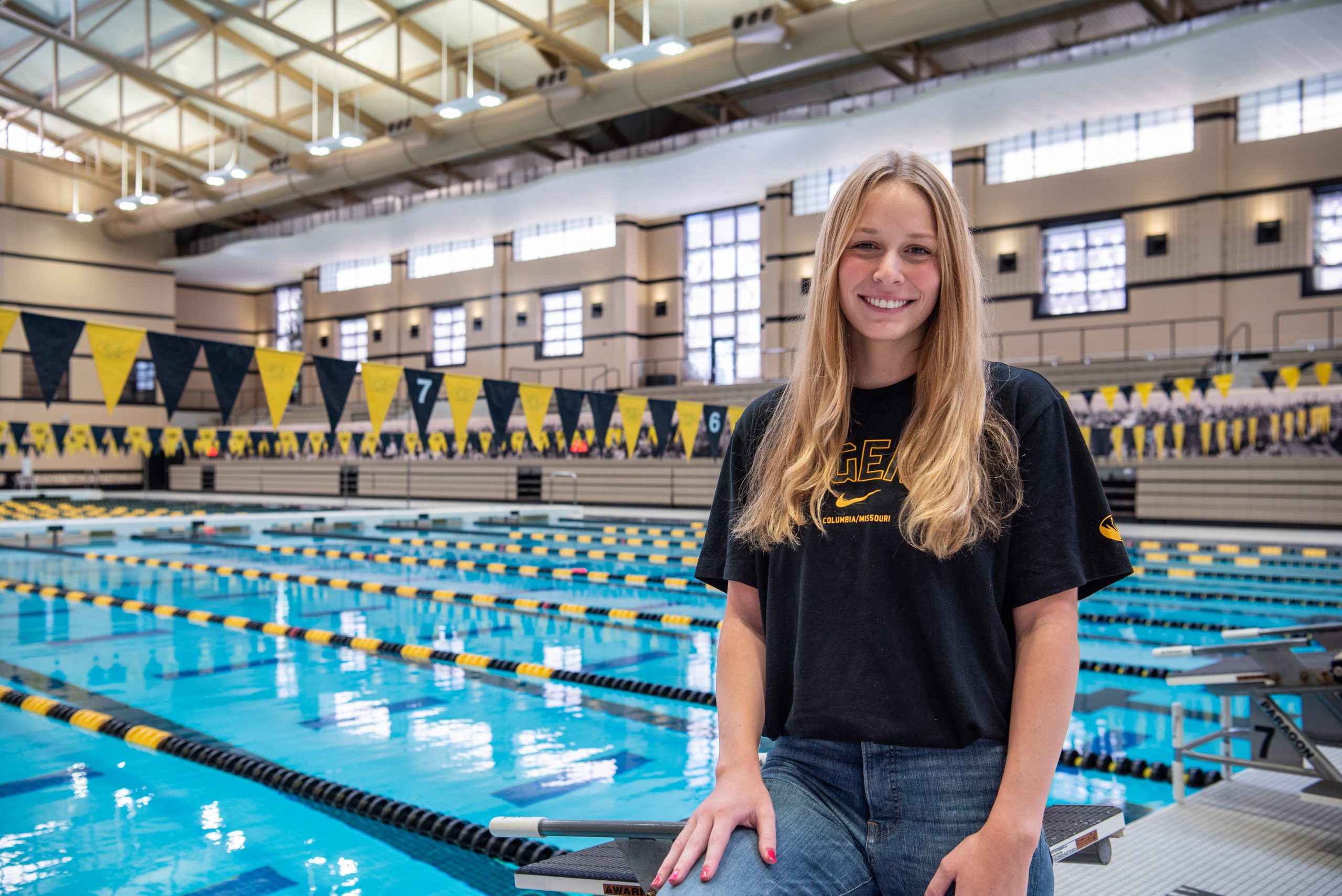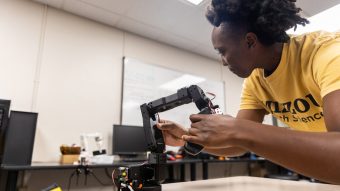Nov. 1, 2022
Contact: Marcus Wilkins, wilkinsm@missouri.edu
Molly Winer hit the ground running — or the pool swimming, rather — as a University of Missouri student-athlete. During her freshman season in 2019, in her first event at the Division I level, she set a Mizzou record in the 200-yard medley relay swimming the breaststroke leg.
Out of the pool, Winer dove into undergraduate research in the College of Arts and Science. A senior dual-major in biology and psychology from Ames, Iowa, Winer studies how neurons work in the brains of zebrafish in the lab of Anand Chandrasekhar, professor of biological sciences.
Read on about how Winer orchestrates academic, athletic and social pursuits — and how she overcame an injury to get back in the water and help other athletes.
When did you realize you excelled at swimming?
When I was eight, my parents said, “You can try any sport you like, but you have to finish the season.” So, I tried it all: gymnastics, soccer, T-ball — you name it. I hated everything. In soccer, I got hit in the head with the ball once, and that was it. And I wouldn't even touch the bars in gymnastics because I thought they were scary.
Swimming is the only sport that I returned to for a second season. It’s an interesting sport because, although we are a team and we’re very social, for three or four hours a day, my head is in the water. Your teammates are always around cheering you on, but at the end of the day, you are pushing yourself.
Why did you choose Mizzou?
I swam at the Mizzou Aquatic Center in high school, so I knew I liked the pool. But I was totally one of the cliché stories: I knew Mizzou was the place for me as soon as I arrived. We have a great team culture, and I felt like I was a part of it right away.
I also knew I wanted to do research early on, so I visited the Office of Undergraduate Research. I have always been interested in neuroscience, and Dr. Chandrasekhar’s lab seemed like a perfect fit. Participating in research as an undergraduate has definitely solidified my desire to incorporate it into my career. What I’m doing now is a bit more hard-science. I’m interested in brain imaging, and I’m in the process of applying to graduate school.
Describe the research you are performing and what you’ve gotten out of the experience.
I work with seven-day-old zebrafish larvae, and we’re trying to find evidence, using retrograde labeling, for a connection between the optic tectum (the brain region that enables fish to see) and neurons in the hindbrain that enable fish to eat. Basically, I inject light-sensitive dye into neurons in the hindbrain and look for connections that can be traced back to neurons in the tectum.
Zebrafish have brains similar to humans in some important ways, but they’re almost fully developed after only seven days. The research is part of a lab’s larger goal that looks at how neurons migrate, and if they migrate incorrectly — because of genetics or disease — can networks in the brain compensate to overcome it?
Presenting my research poster at the Undergraduate Research Forum helped me to realize sometimes I’ll use terms not everyone knows, or maybe I’m talking too fast. Or people would ask about my ‘results’ and I would have to explain that I’ve really just started. The experience has made me overall better at articulating my thoughts and explaining my research.
You missed competition this past season due to a complication from COVID-19. What did you take from that experience?
I tested positive in January and was on glorified bedrest for two months. I handled it with humor and cracked a lot of jokes. But when my team left for the next meet without me, I lost it. It wasn’t until May that I returned to competition. That’s when the value of mental health became apparent because the sport that I had loved for 10 years was ripped away from me. When I finally returned to practice, my team stopped what they were doing and cheered. I still almost cry talking about it.
How has that experience made you an advocate for prioritizing mental health?
I became a campus captain for The Hidden Opponent (THO), a national nonprofit and advocacy group that raises awareness for student-athlete mental health. It’s an organization that connects student-athletes to mental health resources, helps schedule guest speakers and provides general support.
Mizzou provides in-house therapy along with sports psychology help at any level you want it. THO adds a national network to connect with all kinds of people from all kinds of places. THO also offers opportunities to hear mental health professionals and people in sports speak and share their stories.
I’m excited to be able to establish a connection to THO for the student-athletes who come through Mizzou after I graduate.




